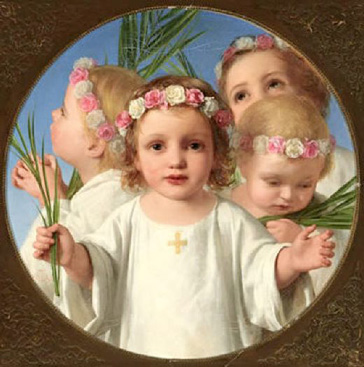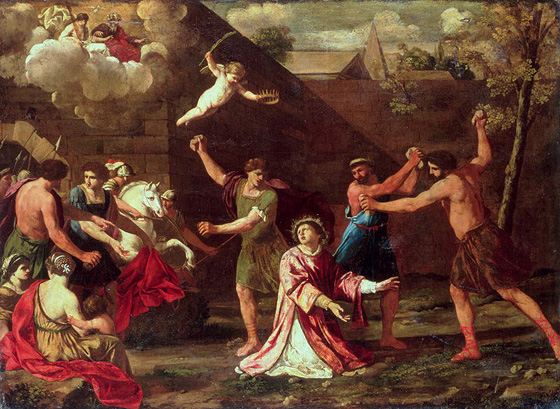In today’s Gospel, after Mary and Joseph spent days searching for Jesus, only to find him in his “Father’s house”, what they don’t say to each other speaks volumes. Mary doesn’t say, “not another word out of you young man, get on that camel right now.” Joseph doesn’t say, “you are going to be sweeping the wood shop until the broom breaks.” Jesus doesn’t say, “I am twelve years old, and I happen to be the Son of God, so you just take care of the house and the wood shop and I’ll save the world, okay?” They didn’t understand completely why Jesus did what he did, but they loved and accepted it, and Mary guarded all these things in her heart. Jesus counted on them to understand and accept him, just like every good family does.
We all take our family for granted. “For granted” doesn’t mean we don’t appreciate them and show gratitude for all they’ve done, and are for us. A family is a gift, and our family is our family no matter what they do or don’t do on our behalf. We feel that all too well when we don’t respond to the love shown us by our family, or when we lose a member of our family unexpectedly and see what a hole that leaves in our life. We count on our family, and that reliance on our family reflects the reliance we should have on God. When we can’t count on our family, it’s hard for us to count on anything else, even God. We all know of truly tragic and heart-breaking family situations – divorce, children lost to drugs, squabbles over inheritances, misunderstandings, even betrayals – but even in those situations we don’t lose sight of the ideal which Sirach reminds us of in the First Reading: a father and mother set in honor and authority over their children, children revering and praying for their parents, obeying them and caring for them when they grow old, and the blessings God showers on children who do so. This model of mutual respect, help, and reliance is meant to be reflected in our society as well, so when it’s not lived in the family it’s no surprise that society suffers as a result. Our family is more than what they do or don’t do for us, and more than what they mean or don’t mean to us: they are our family. God’s given them to us.
The family God’s given us as a gift is the bedrock of love on which we build our love. Sunday in the octave of Christmas is about the Holy Family. Our Lord is telling us today that family is more than just something to take for granted. Our family ties, be they biological or adoptive, are the bedrock for love. They’re more than a simple hereditary or social obligation. We build on them by loving and being loved in return, and sometimes even loving when we’re not loved in return. Christ reveals God to us as Father. Not just as his Father, but as wanting to be Our Father as well. When we realize that we are chosen by God the Father as his adopted children, and as his creation, we see how a holy family should be, as St. Paul reminds us in the Second Reading: holy and beloved.
We’re made holy by sharing in the life of God, through our Baptism, and we are beloved because we have received the gift of life itself, no strings attached. We build our love on that bedrock of divine love by bearing with one another and forgiving each other when grievances come, just as the Lord has forgiven us for all those times we haven’t shown him the love he deserved. With a spirit of gratitude to God for the gift of life and the gift of his son we serve and love each other in our family, avoiding bitterness and provocations and disobedience. “Obedience” grates on ears today, in a world that’s so obsessed with autonomy and self-reliance, but in a family it means acknowledging the gift God has given us of someone we can rely on. We show gratitude by obeying, and it reminds us that being someone relied on can be a big sacrifice and responsibility as well.
Finally, we can’t forgot those who’d categorize their family experiences as more of a trauma than what we’ve considered today. God calls our loved ones to love, and sometimes they don’t respond to that call. It’s the mystery of human freedom and sin. He calls us to love as well, and when we consider Christ’s example we know our love can’t be tarnished by a lack of love from others. Don’t feel left out in the cold: the Holy Family always has room for you, and the Church is always praying for you. The bedrock of love is always there, and forgiveness, even when a loved one doesn’t show it, is the balm that will bring you peace and consolation. Don’t be afraid to say “I forgive,” and don’t be afraid to say “I’m sorry” either. It’s often the trigger for many people rediscovering that the bedrock of love on which their lives are built is not buried that deep after all. It doesn’t mean that you’ll forget, and many times it doesn’t mean that what happened will hurt any less, but it will give you a peace that the world can’t give.
Let’s pray today that families be united in love, like the Holy Family, that those separated by misunderstandings and squabbles may find reconciliation, and that the whole Christian family may be re-united to God the Father through his son.
Readings: Sirach 3:2–6, 12–14; Psalm 84:2–3, 5–6, 9–10; Colossians 3:12–21; Luke 2:41–52.





